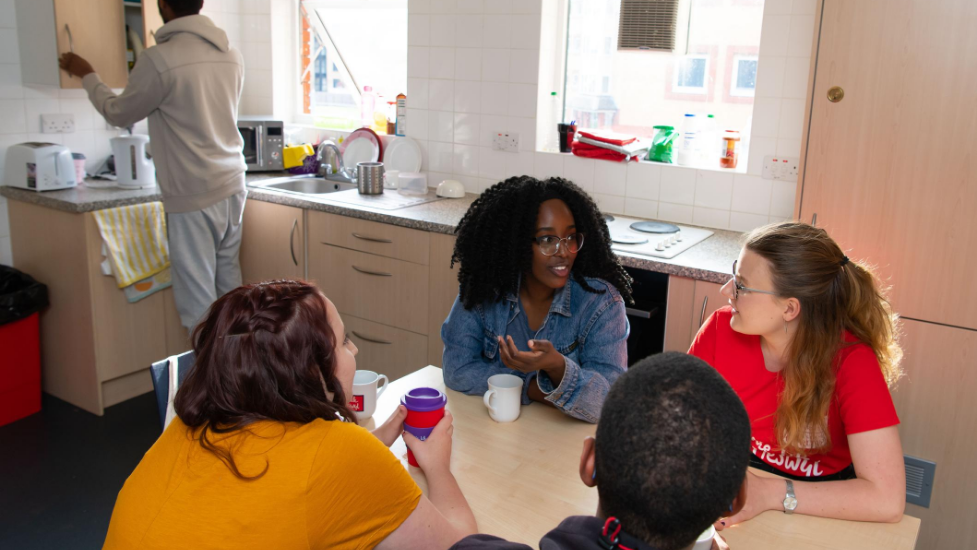Accommodation
Food Hygiene in Halls
S hared fridge storage rules

Eating out and getting a takeaway
When you start university and meet new people you may be socialising over a shared meal, eating out at a restaurant or getting a takeaway with new friends.
Whether you’re eating out or ordering a takeaway you can check the food hygiene rating of the food business by checking the sticker or asking the staff at the restaurant. Ratings are also provided on the delivery platforms, takeaway menus or on the Food Standards Agency website so you can make more informed choices about where to buy and eat food
If you’re reheating your leftovers make sure you’re heating food until it is piping hot all the way through. Do not keep leftovers for more than 48 hours.
Take particular care with rice dishes as you can get food poisoning from eating reheated rice. You should never reheat rice more than once. Ideally, takeaway rice should be eaten shortly after purchase or shortly after it has been delivered. Unless you’re sure it has only been cooked once, it shouldn’t be reheated.
Make the most of your food
When budgets are tight, avoiding unnecessary food waste can be a useful way to make your money go further. This does not mean having to compromise on food safety.
A freezer acts as a pause button. This means food in a freezer won't deteriorate and most bacteria cannot grow in it. You can freeze pre-packaged food right up to the use-by date.
Leftovers and homemade foods should be frozen as soon as possible. Make sure any warm dishes are cooled before putting them in your freezer. Freezing food into individual portions will make them easier to defrost and you will use only what you need.
Love Food Hate Waste have some useful tips and advice on how to make your food go further and reduce waste.

And finally keep it clean
Follow these handy tips to keep your shared kitchen clean.
- Wash your hands with warm soapy water before you prepare, cook or eat food.
- Wash or change dish cloths, tea towels, sponges and oven gloves regularly. It's important to let them dry before you use them again.
- Take care to keep all utensils and dishes clean before preparing food to avoid cross-contamination.
- You should use different utensils, plates and chopping boards when preparing ready-to-eat foods and raw foods that require cooking. Remember to wash them after each use so they’re clean for the next person to use.
- You should not wash raw meat. Washing meat under a tap can splash bacteria onto your hands, clothes, utensils and worktops. Cooking will kill any bacteria present.
- Remember to wash fruit and vegetables with water before you eat them. You should wash them under a running tap, or in a bowl of fresh water, making sure to rub their skin under the water.
Topics
- Read Next
-
 5 tips on starting placement for healthcare students
5 tips on starting placement for healthcare students
 Tips and Tricks for Reading Academic Articles
Tips and Tricks for Reading Academic Articles
 Dealing with Culture Shock
Dealing with Culture Shock
 Understanding the UK Healthcare System - An International Student's Guide
Understanding the UK Healthcare System - An International Student's Guide
 A guide to cooking at University
A guide to cooking at University
 Res Life Project Group Events
Res Life Project Group Events
 Res Life Podcast - Episode 2
Res Life Podcast - Episode 2
 Calling freshers from Hong Kong: how do you adapt to Cardiff life?
Calling freshers from Hong Kong: how do you adapt to Cardiff life?
 Navigating Cultural Shifts & Thriving as an International Student in the UK
Navigating Cultural Shifts & Thriving as an International Student in the UK
 Balancing Act: Managing Academic Workload, Internships, Extracurriculars, and Social Life as a Law Student
Balancing Act: Managing Academic Workload, Internships, Extracurriculars, and Social Life as a Law Student
- Popular
-
 Talybont South student guide
Talybont South student guide
 How to...report a maintenance issue
How to...report a maintenance issue
 How to...laundry
How to...laundry
 What to bring to uni?
What to bring to uni?
 Catering in Residences
Catering in Residences
 Talybont North Student Guide
Talybont North Student Guide
 Running routes in Cardiff
Running routes in Cardiff
 Settling in FAQs
Settling in FAQs
 University Hall Student Guide
University Hall Student Guide
 Which Residence is Right For You?
Which Residence is Right For You?


